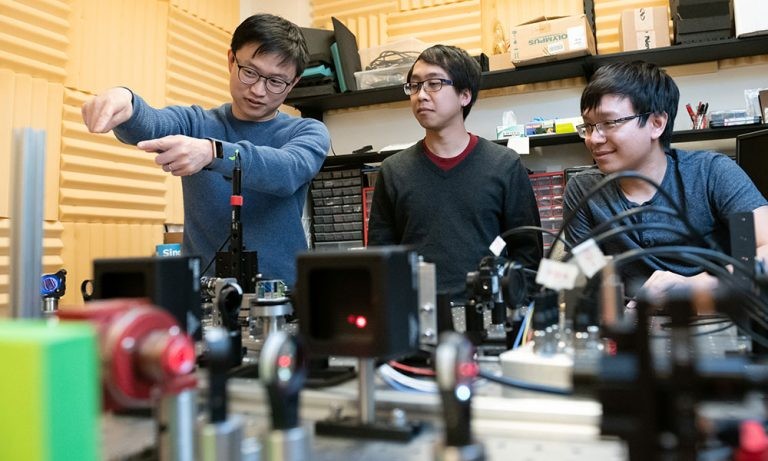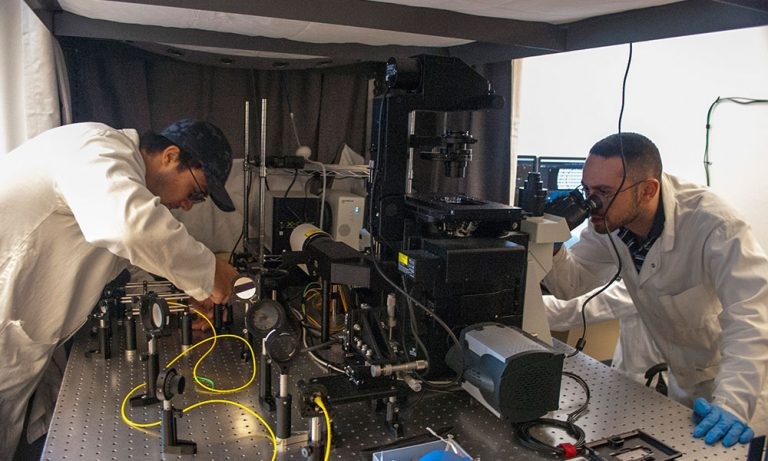ISAAC LI HAS BEEN INSPIRED BY HIS RESEARCH ever since joining UBC Okanagan’s chemistry department in January 2016.
His current work focuses on developing force-responsive DNA nanostructures that can be used to study the physical interactions between cells. These interactions are key regulators in the development of organisms and diseases such as cancer metastasis. For this work, Dr. Li, an assistant professor in the Irving K. Barber Faculty of Science, recently received a Tier 2 Canada Research Chair (CRC) in Single-Molecule Biophysics and Mechanobiology. He also holds a Michael Smith Foundation for Health Research Scholar Award.
“The human body is made up of connected cells and cells that migrate through tissues. How they physically interact dictates their behaviour, so we need to understand cell signalling beyond the traditional chemical means into the new realm of mechanobiology—or, how cells communicate through their sense of touch. And we need to do this at the molecular level to understand the interaction mechanisms.
“Our research drives a deeper understanding in basic biology, such as embryonic development, and helps us understand disease processes like inflammation and metastasis,” Dr. Li explains.
With state-of-the-art single-molecule biophysics tools such as optical tweezers, an atomic force microscope, and single-molecule and super-resolution microscopes, individual DNA molecules can be designed and used to directly visualize how individual cell receptors experience mechanical forces. Dr. Li’s lab develops novel DNA-based molecular tools and new biophysical techniques to solve these problems. For him, the end goal of his research is to better understand disease, adding that he finds the intricate nature of his work enjoyable.
“I consider my work to be a lot of fun. Understanding and controlling the actions of biological molecules one at a time is a fascinating and fundamentally important problem, especially if they can be applied to provide new mechanistic insights into disease processes,” he explains. “In particular, the CRC appointment will help us put a laser focus on research for the next 5-10 years.”
Dr. Li also recently received a $250,000 grant from the New Frontiers in Research Fund to work on a separate—but related—project to develop a new diagnostic tool to detect early signs of disease.
“We’re trying to find a way to take a liquid biopsy, like a blood sample, and find variations in an individual’s molecular make-up that may put them at higher risk for a particular disease. This is an interdisciplinary application that crosses different faculties on campus—chemistry, engineering and health and exercise sciences, and so far, has proved to be very fruitful.”
A culture of sharing and growth
Following his postdoctoral research, Dr. Li’s search for a tenure-track research position was short and sweet—with UBCO being his first interview. “I chose a career in chemistry at UBCO because of its wonderful colleagues and collaborative opportunities,” he says, adding that he feels very fortunate to have landed here.
“My colleagues, particularly in chemistry, are awesome—we’re a collaborative department that shares all sorts of things, including our equipment. We open our doors to discussion with everyone in chemistry and the entire campus.”
Though he spends most days in the chemistry department, Dr. Li and his colleagues are also actively involved in high-level conversations with campus leaders. “We’ve had a lot of discussions with the leadership team to help identify some of the strategic directions we should take, current problems we’re facing, and how to provide better opportunities and support to students. This campus is my second home, and how it grows is important to me,” he adds.
Teaching and supporting student research
Having spent most of his adult life as a student and researcher at large universities, Dr. Li now enjoys being part of a closer-knit campus community.
“Things are a bit different here,” he says. “I’m teaching small undergraduate classes and have the opportunity to build mentoring relationships with some of my students,” he explains. “I’m able to provide them with better guidance and help them reach their full potential or see the world from different perspectives. I find that very fulfilling.”
Dr. Li also tries to learn most of his students’ names. “Not only does it help with better engagement in class, but the students feel more connected to me, and that motivates them to try harder.”
While Dr. Li appreciates smaller class sizes from an instructional point of view, he says they’re also better for students. “It improves access to professors, meaning I’m available to carry out deeper science discussions with students beyond simply helping them with problem sets. It’s also much easier for students to get involved in research before graduate school to see if they like it, and to figure out what research direction interests them most.”

UBCO offers undergraduate students a number of opportunities to pursue original research, including the Undergraduate Research Awards and Work-Study programs. “It’s a level of support you don’t always see at other institutions,” says Dr. Li.
As a research-intensive new faculty member, Dr. Li notes that producing quality research is not only good for growing the campus’ global reputation and research output, but it’s also beneficial for students.
“When students know they have a professor who deeply understands the content and works at the frontier of the subject—there’s a certain level of respect and curiosity that comes with that. I encourage my students to ask questions beyond my knowledge, and that inspires them to go explore the unknown.”
The post Dr. Isaac Li studies a cell’s sense of touch through designer DNA appeared first on UBC Okanagan News.
